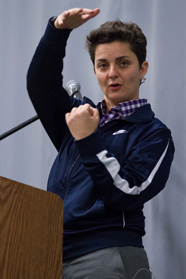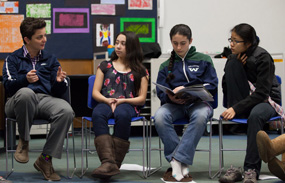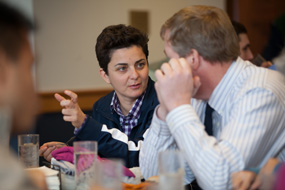 “If you had one wish in the world what would it be?”
“If you had one wish in the world what would it be?”
Luma Mufleh’s grandmother used to ask her this when she was a child. Mufleh’s response was usually a new toy or soccer cleats. Then she would ask the same of her grandmother. “Her answer was always the same,” said Mufleh. “’I wish everyone in the world would have clean drinking water.’”
Speaking in the third annual Sara Wattles Perry ’77 Lecture, Mufleh told the story of her privileged childhood growing up in Amman, Jordan; hitting rock bottom twice after her parents cut her off financially; and how a wrong turn led to the first private school in America dedicated to the education of refugee children.
“I made a wrong turn.”
On what seemed like a normal day in Clarkston, Georgia, Mufleh made a wrong turn and encountered five boys playing soccer in a parking lot. She watched them and remembered the pickup games she had played with her brothers in Jordan.
After graduation from Smith College, when she had decided to stay in the United States, Mufleh’s parents cut her off financially. “This was the first time I hit rock bottom,” she told the gathered Williston community on November 30. Forced to work illegally for a year, Mufleh was living on a steady diet of ramen noodles while cleaning bathrooms, washing dishes for less than half of minimum wage, and running her own café.
Inspired by the boys she had seen, Mufleh returned later in the week with a new soccer ball. The boys agreed to let her play. “I hadn’t had that much fun in a long time,” said Mufleh. Afterwards, all six of them piled into her VW Beetle and drove around the neighborhood recruiting enough players for a team.
In the first week of practice Mufleh noticed that one of the boys wasn’t playing his position. She asked another player what the boy’s name was.
“Oh, that’s One Shoe,” the second boy said.
Mufleh, confused, looked at One Shoe and saw that he was only wearing one oversized, black sneaker on his left foot. His other foot was bare.
“He didn’t have a care in the world as he laughed and fooled around with the other kids,”  said Mufleh.
said Mufleh.
“That night I put away my brand new kangaroo leather cleats, never more ashamed in my life…I promised myself I wouldn’t wear them until all of my kids could,” she said.
As the boys became comfortable with Mufleh she would help them with their homework after practice. A few questions quickly snowballed into regular tutoring sessions. At around this time, the café closed and Mufleh declared bankruptcy. The same day the café closed the mother of one of her players offered her $50 and a place to stay. Mufleh had hit rock bottom again.
When she feels discouraged, “like every door is closing,” she remembers the pep talk one of her players repeated to himself while riding uphill on a bike three sizes too small.
“C’mon Nee-Shawn, c’mon Sunshine. You can do it, you got it,” he chanted. It was Nee-Shawn; an 11-year-old, riding a single gear bike whose knees came up to his chest with each pedal, coaching himself up the hill.
“It was what I needed to remind myself we’re going to do this,” said Luma. “Every time I go to the dark side I say to myself, ‘Come on Luma you got it, you can do it.’ I skip the sunshine part.”
The Slow Climb Uphill
Now that she was tutoring the boys on a regular basis, Mufleh realized she needed help and that she couldn’t provide the education these boys needed on her own. So after gathering donations, Mufleh opened the Fugees Academy. The first private school dedicated solely to the education of refugees, the school has a rigorous college-prep curriculum for students in sixth through twelfth grade.
 With 58 enrolled students in sixth through ninth grades, the Fugees Academy has reached capacity in the space they rent from the United Methodist Church. This fall was the first semester the school had to turn kids away due to a lack of physical space. In 2009, with the help of donations from Fugees Academy sponsors, Mufleh purchased 19 acres on which she hopes to build the new Fugees Academy. The facility will hold 300 students and will have enough soccer fields for five teams to play.
With 58 enrolled students in sixth through ninth grades, the Fugees Academy has reached capacity in the space they rent from the United Methodist Church. This fall was the first semester the school had to turn kids away due to a lack of physical space. In 2009, with the help of donations from Fugees Academy sponsors, Mufleh purchased 19 acres on which she hopes to build the new Fugees Academy. The facility will hold 300 students and will have enough soccer fields for five teams to play.
“I know I can never make everyone in the world have clean drinking water as my grandmother wished, but I can make sure all my Fugees do,” she said.
“I love what I do,” said Mufleh. “In the past eight years I’ve gone from playing a pickup soccer game in a parking lot to running the first private school dedicated to refugee education in the country.”


